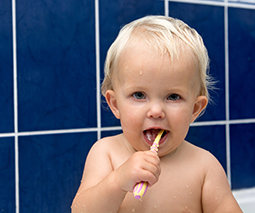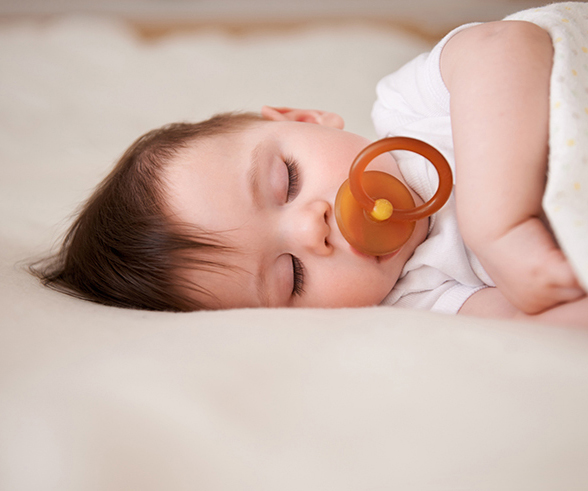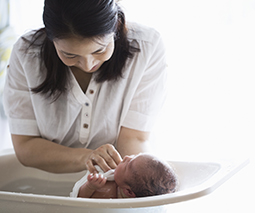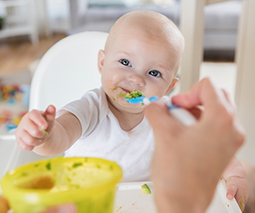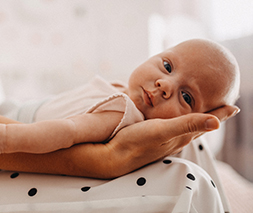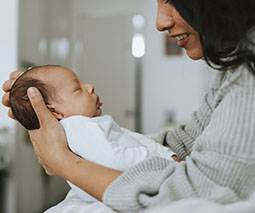Sleep expert, Jo Ryan answers your top 7 baby care and sleep questions
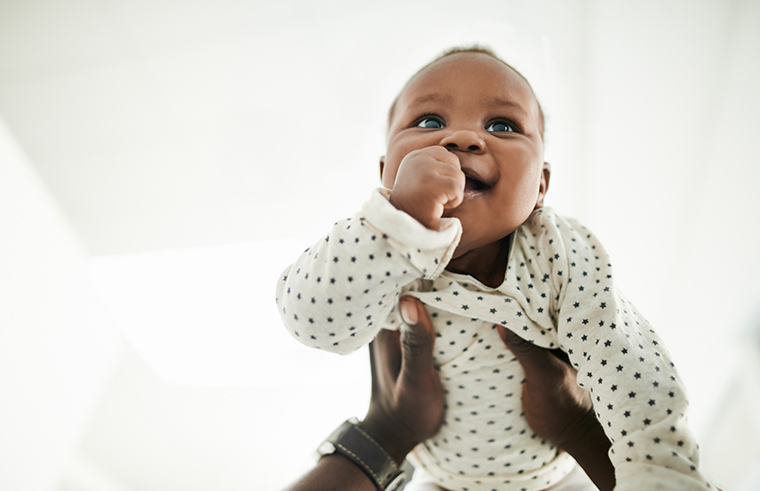
The number one concern new parents often have is around their baby’s sleep. Fortunately, sleep expert and Director of Baby Bliss, Jo Ryan, has helped countless parents with their baby sleep and baby care concerns. We asked Jo to answer some of your top questions so you – and everyone in your home – can rest a little easier.
Question 1: Why doesn’t my baby get into a deep sleep in the morning?
Samantha asks: “My six-week-old bub doesn’t seem to be able to get into a deep sleep in the mornings. I put her down after an hour with a nice full tummy, but she just doesn’t seem to be able to stay asleep!”
Jo says: Tiny babies do have periods where they can be a little bit more wakeful – for some babies, it’s the afternoon or the evening, for others it might be the morning. Or she might be experiencing a developmental leap or growth spurt, which happens around six weeks. It might also be that she’s starting to be able to be awake a little bit longer than an hour at that period of the day.
Up to six weeks old, your baby needs roughly 16 to 18 hours sleep a day. But we’re all different and some babies cope better with more sleep, or they just naturally need more sleep, and some babies need a bit less. My rule of thumb is that between zero to six weeks they shouldn’t be awake for more than about an hour. And for some, for the first wake time of the day, they may only need to be up for 45 minutes – that’s where your routine comes in. Once they’re down, they should be sleeping until they are due for their next feed; that could be an hour and a half, to two and a half hours, depending on how often you’re feeding them.
Some babies are being fed every two hours; some are being fed every four hours. Try to work out what works best for your baby – there’s no magic number. It’s the awake time that you need to keep in check. Sleeping for 15 minutes is not ideal because they need to have a restful, rejuvenating sleep and that’s usually about an hour and a half, as they have about 45 minutes sleep cycles.
When babies start to do something differently, or something’s not working when previously it was, generally it’s a good idea to just check that the routine is going okay. Perhaps you might need to adjust it slightly; but as long as she’s getting enough sleep overall during the day it’s not cause to worry.
Question 2: My baby won’t sleep between 5-9pm. Is this normal?
Samantha’s follow up question to Jo: “Bub also won’t sleep between 5-9pm. She’s not unhappy, but just wants to be awake. Is this normal? Or would she be overtired from not enough sleep in the day? Are they actually hungry at this time? Or do they just have a more wakeful period?”
Jo says: It could be all of those things. All of those things contribute to that wakefulness in the evening; it’s the ‘witching hour’ so they could be overtired if they haven’t had enough sleep in the day. And often your milk will decrease as the day goes on, so they can be a little more hungry.
Some things you can do for the witching hour is feed a bit more regularly; if it’s been two hours since you fed her and she’s still awake, pop her on the boob again or take her into a dark room, wrap her up, cuddle her, or use a sling if you have to get stuff done. And prior to that time of the day, if you can, try to make sure that she’s getting enough sleep.
The witching hour tends to sort itself out naturally by about three months. But it can be a really distressing time for you, because your baby is often very distressed. Wearing them can help because they’re near you and then you’ve also got your hands free to do whatever you need to do at that time of the day.
Question 3: How can I get my baby to sleep longer at night?
Carly asks: “My seven-month-old is still waking during the night for a feed every three hours. I feel as though this is a behavioural wake-up habit and I’ve tried resettling her during the night, but she will get so distressed that she wakes up our two-year-old in the next room. Any tips on getting a longer stretch of sleep at this age?”
Jo says: By seven months, usually they should only need one to two feeds through the night. I would say one, because she should be eating solids now. She should weigh around or over eight kilos, which is the magic number.
Babies do absolutely get into the habit of waking to be fed, and if they’ve been feeding to sleep for their whole life, that’s what they’re used to. And so they think that the only way they can get back to sleep is by feeding. When you try to change that and not offer the feed – and the feed is beautiful and calming and lovely – she’s not going to like it.
But the good news is that you can change it, you just have to resettle her without feeding. And that is easier said than done. There will be quite a bit of crying, but I think if you can stay with her, settle her, soothe and support her through her distress, pick her up and calm her – but just don’t put her on the boob – eventually she will go back to sleep. She absolutely will. 100 percent.
And then once you’ve done that once, it’s amazing how quickly babies’ brains just get it. Something clicks and she’ll go, ‘Oh, actually, I can go back to sleep without the boob or the feed’, and the next time you settle her without the feed it’s not going to be so difficult.
A good place to start is by resettling her without a feed once a night; and I would generally say that earlier in the night is probably better than 4 or 5am in the morning.
The thing I know is that they always sleep. But it’s hard when you try to resettle them for 20 minutes and they’re screaming and you’re like, ‘Oh my god, this is never gonna end!’ It does though. And you don’t have to leave them. You don’t have to walk away. She’ll be crying because you’re changing something. That’s her way of expressing, ‘What the hell is going on here?’ But as long as you’re there, and you’re soothing her and picking her up and calming her – do whatever you need to do, but just don’t give her the feed – eventually she’ll go back to sleep. They always do. You’ve just got to outlast them.
Question 4: Do babies have different cries for different needs? Or is this just a myth?
Sasha asks: “I’m due with my first baby in about a month. I’ve heard that babies can use different cries to indicate different things from a very young age: is this true? Or just a myth? I haven’t spent much time around babies so I’m a bit nervous that I won’t know which cries are which! It would be great to be able to speak our baby’s language.”
Jo says: There has been quite a lot of work done around babies’ cries. So there is some research to suggest that babies do have a different cry when they’re very, very young. But by the age of about three months, that all kind of goes out the window.
I wouldn’t stress too much about trying to decipher what they’re telling you. The thing is, babies will cry. When babies are tiny, the things that they cry about primarily are hunger and tiredness, so it’s just a good idea to arm yourself with some knowledge about what tiny weeny babies need.
They shouldn’t be awake for more than an hour at a time, which doesn’t seem very long. If your baby’s been fed and they’ve been awake for a period of time and they’re crying, generally it would be that they are tired. Or if your baby hasn’t fed for two or three hours and they’re crying, and they’ve just woken up, then generally it’s about hunger.
It’s good to just have that little checklist in your brain. They also may cry just because they’re wet or dirty, or they just want to be held.
Babies will have their own idiosyncratic way of crying and you will pick that up: you’ll get to know your baby. Get to know them, notice what they do when they’re tired and when they’re hungry. And then you can go on with that.
Question 5: How do I get rid of my baby’s cradle cap?
Billie asks: “My five-week-old baby girl has cradle cap in patches on her scalp, and even coming down onto her forehead. I know it’s fairly normal, but do you have a recommended method for removing it? Any safety tips we should be aware of? I know you can buy creams, and a few friends have suggested using olive oil and combing it out each day. But what’s the best method? And how long should it take to go away?”
Jo says: Cradle cap is one of those annoying things because it can hang around for a long time. There are a lot of natural remedies: apricot oil is good rather than olive oil, as it’s low allergenic. You can apply oil morning and night and comb through with a nice soft comb – this can often release the cradle cap from the scalp.
When they’re in the bath, use a wet flannel or washer and rub firmly (but not too firmly) across their scalp to release some of the cradle cap from the scalp. It can be really stubborn and difficult. If you’re worried, it’s worth going to your GP to have a discussion about that, or go to the pharmacy and ask the chemist what they would recommend.
I wouldn’t stress out too much; some babies have it for a very short period of time, some babies have it right up till they’re toddlers – it just depends on your child, really. So there’s no hard and fast rules around that.
Question 6: My baby tilts her head to the left. Should I be concerned?
Trixia asks: “My daughter is 10 months old and she tilts her head to the left. This comes and goes. Is this a habit that she will shake? Or is it something we should get checked out?”
Jo says: We all have little things that we do, but some babies can get shortening on one side of their neck muscles. It could be from the way they were in utero, which leads them to favour that side.
If she’s doing it all the time it might be worth talking to your GP, or you could try an osteopath if you’ve already seen your GP. Sometimes an osteopath can just have a feel of the muscles. But if she’s favouring her left side and she’s not looking the other way, that can get worse, so it might be worth having a chat to your GP and get them to have a look.
Question 7: How often should I bathe my baby?
Mika asks: “I’m a first time nervous mama and I’ve heard that little babies don’t need a bath every single day. We bathe her every third day or so, but is this often enough, or too often? My four-week-old just adores her bath and it really helps her settle in the evenings – would it be harmful to her skin to bathe her daily?”
Jo says: That’s totally your call: daily or every three days is fine when they’re tiny. Some babies love it, but for other babies they hate the bathing process because they hate being naked or cold; or they like being in the bath but coming out can cause them to be a little bit distressed.
They’re not getting dirty by being outside or eating food, and we’re obviously wiping their bottoms and cleaning their nappy area, so it is absolutely up to you as to what you think will work for her. This is again about watching your baby and working out what she likes.
For some younger babies who have that witching hour in the afternoons and evenings, they can be quite distressed and not want to go to sleep. In this case, having a bath can be the perfect way to deal with that. It can calm her and give her into that lovely warm feeling. Then you can feed her and put her down.
Watch Jo Ryan answer your questions about baby care:
Head over to the Facebook event page for details on all the sessions in our second Q&A series for parents! Get your questions ready for our team of Bub and Me experts to answer live.
The Babyology Masterclass series is sponsored by BIG W, where you can find everything you need for pregnancy, baby and beyond.
